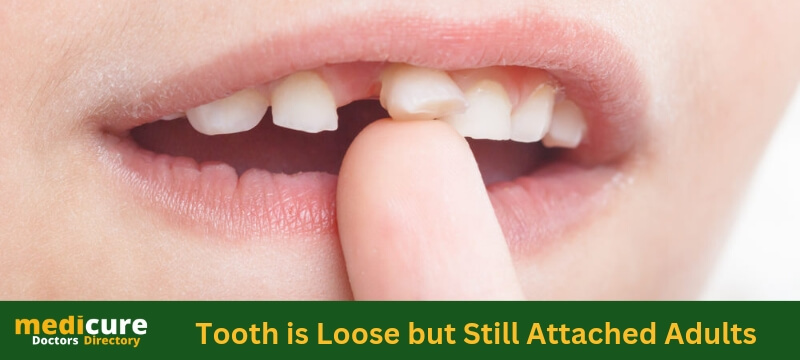MediCure

Tooth is Loose but Still Attached Adults
- September 8, 2023
- 0 Likes
- 0 Comments
Tooth is Loose but Still Attached Adults
Discovering that a tooth is loose but still attached adults can be concerning, but it’s a situation that can often be addressed successfully with prompt dental care. Remember, early intervention and good oral hygiene are your best allies in preserving your dental health.
Thank you for reading this post, don't forget to subscribe!Tooth is Loose but Still Attached Adults
Loose teeth aren’t just a childhood concern. It can be disturbing for adults to realize that a tooth is loose but still attached. Still, understanding the causes, symptoms, and obtainable treatments can help you navigate this situation with self-confidence.
Understanding Loose Teeth in Adults
Loose teeth in adults can happen for various reasons. While it’s less common than in children, it’s crucial to address the issue promptly to prevent further complications.
Causes of Loose Teeth
1. Trauma
Accidents or injuries can lead to tooth mobility. Even a seemingly minor impact can result in a loose tooth, so it’s essential to consult a dentist after any dental trauma.
2. Gum Disease
Periodontal disease, generally known as gum disease, is a leading reason of loose teeth in adults. It affects the supporting tissues of the teeth, leading to tooth insecurity.
3. Teeth Grinding
Bruxism, the habit of grinding or clenching teeth, can gradually loosen teeth. It’s often associated with stress and may require interventions like night guards.
Symptoms of Loose Teeth
Recognizing the signs of loose teeth is crucial. Common symptoms include discomfort, pain while chewing, gum bleeding, and tooth mobility. If you notice any of these, consult a dentist promptly.
Tooth is Loose but Still Attached Adults
Diagnosis and Evaluation
A dentist will conduct a thorough examination, including X-rays, to determine the extent of tooth mobility and identify underlying causes.
Treatment Options
Addressing loose teeth often involves a combination of treatments:
1. Dental Splints
Dentists may use splints to stabilize loose teeth, allowing them to heal and reattach to the gums.
2. Scaling and Root Planing
For cases related to gum disease, scaling and root planing can help remove plaque and tartar buildup, promoting gum health.
3. Night Guards
If teeth grinding is the culprit, wearing night guards can prevent further damage and tooth mobility.
4. Lifestyle Changes
Dietary adjustments and quitting smoking can significantly contribute to healthier teeth and gums.
Preventive Measures
Maintaining good oral hygiene and regular dental check-ups are crucial for preventing loose teeth. Early detection can help address issues before they worsen.
When to Seek Professional Help
If you suspect a loose tooth or experience related symptoms, don’t delay. Consult a dentist promptly to prevent further complications.
Personal Care for Loose Teeth
Gently brush and floss your teeth, avoiding excessive pressure on the loose tooth. Rinse with a mild saltwater solution for added comfort.
Foods to Avoid
Steer clear of hard and sticky foods that can worsen tooth mobility.
Maintaining Good Oral Hygiene
Regular brushing, flossing, and using an antiseptic mouthwash can help maintain overall oral health.
Also Read:
Tooth Broke In Half Black Inside: Causes, Treatment
FAQs – Tooth is Loose but Still Attached Adults
1. Can a loose tooth in an adult heal on its own?
In some cases, yes. However, it’s essential to consult a dentist to assess the situation and recommend appropriate treatment.
2. Is tooth mobility always a sign of gum disease?
Not necessarily. It can have various causes, so a proper diagnosis is crucial.
3. Can I still eat normally with a loose tooth?
It’s best to avoid hard or sticky foods until the issue is resolved to prevent further damage.
4. Are there any home remedies for loose teeth in adults?
While maintaining good oral hygiene can help, professional dental care is typically required.
5. Is loose tooth extraction the only solution?
Extraction is a last resort. Dentists will explore other treatments to save the tooth whenever possible.